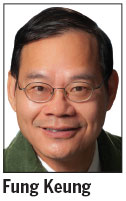Principles are more important than money
Updated: 2014-03-19 08:19
By Fung Keung(HK Edition)
|
|||||||
Thank heavens, the Alibaba fiasco has finally ended.
The Hong Kong Stock Exchange and Securities and Futures Commission officials should be praised for sticking to our cherished principles of equity and fairness. These are the core values of Hong Kong, respected by the international investment community.
Whether you are a millionaire living on Hong Kong Island or a person who lives in a public housing estate in Tsuen Wan, your shares in a public company listed on a Hong Kong bourse enjoy equal rights, i.e., one share, one vote.
Internet giant Alibaba's founder Jack Ma and its senior managers jointly hold about 10 percent of the company's shares, but they want control of the company by owning a different class of shares that would give them control of the company's board. This is simply not acceptable. (Alibaba's major shareholders are Softbank of Japan and Yahoo of the US.)
Yes, we might lose Alibaba's multimillion-dollar initial public offering business as it has indicated that it will seek a listing on the New York Stock Exchange. But our consciences are clear. We won't sell our souls for the sake of making a quick buck. This is Hong Kong, a place all Hong Kong citizens are proud to call home.
Hong Kong already is suffering from an increase in corporate non-compliance. Recent research by BDO Ltd highlights several areas of non-compliance, which include the lack of a whistle-blowing policy, a policy to communicate with minority shareholders and a policy to separate roles of the company chairman and Chief Executive Officer.
About 82 percent of Hang Seng Composite Index firms don't have a policy to talk to their minority shareholders, about 77 percent fail to comply with a requirement to establish a whistle-blowing mechanism for people to report any malpractices involving senior management, the BDO survey shows. About a quarter of Hang Seng Composite Index firms do not comply with the policy of having different people occupying the posts of chairman and chief executive.

Of the 12 industries surveyed, conglomerates, telecommunication, property development and consumer goods showed the worst decline in 2013 compared with a year earlier. Conglomerates that showed full compliance of the code or "provided more information" fell from 86 percent to 25 percent; and consumer goods firms dropped to 53 percent in 2013 from 70 percent in 2012.
In the 1980s many British conglomerates and Chinese family-owned companies listed on the four local bourses were controlled by well-known clans and families. They created class-B shares which gave them 10 times the voting rights of the common A shares which ordinary folks on the streets held. This dual-class share structure was dismantled in the 1990s after years of fierce debate. Now we enjoy a fair system of "one share, one vote".
The farce of the dual-class share system that Alibaba sought is a no-brainer. Can we imagine that in electing the Chief Executive or Legislative Council members by universal suffrage, people living on the Peak would have 10 votes and people living in public housing only have one vote? If that happens, I am sure there would be riots on Hong Kong's streets.
Laws and regulations should be designed to reflect the principle of fairness and equity. Hong Kong Stock Exchange Chief Executive Li Xiaojia was right in saying we shouldn't bend our rules for one company. He should also have emphasized that we shouldn't bend our rules for any company.
Li was also right in suggesting that our securities laws must be revamped from time to time to keep up with international standards. No matter how much the rules change, most Hong Kong people would agree that the principle of "one share, one vote" should never be abandoned.
The author is coordinator of the B.S.Sc in financial journalism program at Hong Kong Baptist University.
(HK Edition 03/19/2014 page1)